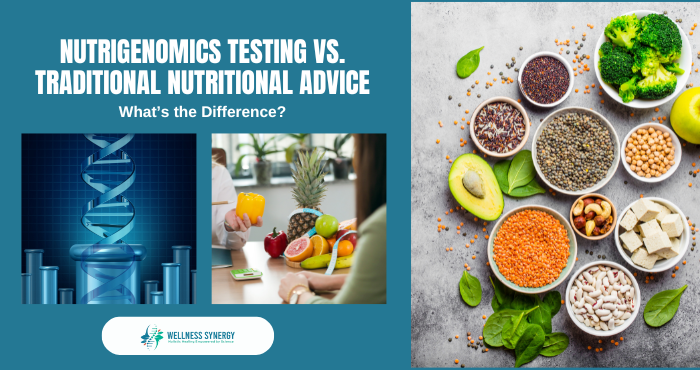Nutrigenomics Testing vs. Traditional Nutritional Advice: What’s the Difference?
People are looking for ways to improve their diets and health. While conventional diet advice has been around for years, a new field called Nutrigenomics Testing is gaining popularity because it offers more personalized health recommendations. Let’s examine both approaches and see how they differ.
What is Traditional Diet Advice?
Traditional Diet advice is general advice that applies to most people. It usually comes from trusted health organizations like the World Health Organization (WHO) or the American Heart Association (AHA). The goal is to improve health and prevent disease through healthy eating habits and exercise.
Examples of traditional advice might include:
- Eating more fruits and vegetables
- Reducing sugar and processed foods
- Eating lean proteins like chicken or fish
- Including healthy fats like those in olive oil and nuts
This advice is meant for everyone, even though people have different health needs and responses to food.
What is Nutrigenomics Testing?
Nutrigenomics testing is a modern science that examines how our genes affect food processing. It can tell how your body responds to different foods, vitamins, and minerals. Nutrigenomics is based on the idea that each person’s genetic makeup is unique, so their dietary needs might differ.
Nutrigenomics testing usually involves a simple DNA test, often from a cheek swab or saliva sample. The results can show you:
- How your body handles fats and carbohydrates
- If you might be low in specific vitamins or minerals
- Your risk for certain diseases based on your genes
- How your body reacts to things like caffeine or alcohol
Unlike traditional diet, this testing helps create a nutrition plan tailored to you.
Key Differences Between Nutrigenomics Testing and Traditional Diet Advice
- Personalization
Traditional diet is general and applies to most people, while Nutrigenomics Testing is highly personalized. The test looks at your genes and gives specific recommendations based on your genetic makeup. - Scientific Basis
Traditional advice is based on research studies and general guidelines, while Nutrigenomics Testing uses genetic science to provide more accurate information about how your body responds to food. - Risk Management and Prevention
Traditional advice is focused on overall health and managing current health issues, while Nutrigenomics Testing can help predict health risks before they happen. It allows you to adjust your diet to prevent future problems like diabetes or high blood pressure. - Flexibility and Lifestyle Adaptation
Traditional advice is often rigid, with one-size-fits-all guidelines. Nutrigenomics Testing is flexible and helps you make a plan that fits your lifestyle, health goals, and preferences. - Accuracy and Precision
Traditional advice is based on extensive studies that may not work perfectly for everyone. Nutrigenomics Testing uses your unique genetic information to give more accurate, personalized recommendations.
Which One is Right for You?
Traditional nutritional advice might be enough if you just need general health advice or want to manage a condition. But if you want a deeper, more personalized understanding of how your body reacts to food, Nutrigenomics Testing might be a better choice. while traditional nutritional advice is helpful, Nutrigenomics Testing offers a more tailored approach to nutrition. Understanding how your genes affect your health can help you create a nutrition plan that works best for you and improves your long-term well-being.
Conclusion
At Wellness Synergy, we want to help you take charge of your health with personalized solutions. Traditional nutrition advice gives general tips for good health, but Nutrigenomics Testing gives you a diet plan based on your unique genetic makeup. You can create a nutrition plan that fits your needs by learning how your genes affect how your body responds to food. Whether you want to manage a health condition, improve your overall well-being, or prevent future diseases, Nutrigenomics & Epigenetics Testing helps you make smarter, healthier choices. Learn more today and unlock your full health potential with the Wellness Synergy personalized approach.
Disclaimer
Wellness Synergy, its products, and Dr. Ilka Tamar do not intend to cure, treat, heal, or prevent diseases or illnesses. These statements have not been evaluated by the Food and Drug Administration. The information on our social media and website is for informational purposes only and is not a substitute for medical advice or diagnosis from your physician or other healthcare professional. This information is meant for general wellness purposes and does not claim to diagnose, treat, or cure any illness or health condition. If you suspect you have a medical issue, please contact your physician or healthcare provider.
FAQ: Nutrigenomics Testing vs. Traditional Nutritional Advice
What is Nutrigenomics Testing?
Nutrigenomics testing examines how your genes influence how your body processes food. It looks at how your genetic makeup impacts your metabolism, nutrient absorption, and food response. This personalized testing is based on your DNA and helps create a diet plan tailored to your needs.
What is Traditional Nutritional Advice?
Traditional nutritional advice provides general guidelines for healthy eating that are intended to apply to most people. It is based on broad research and recommendations from reputable organizations, like the WHO and AHA, focusing on key aspects like reducing sugar intake, eating more fruits and vegetables, and staying active.
How is Nutrigenomics Testing Different from Traditional Nutritional Advice?
Personalization: Traditional advice is general and applies to everyone, while Nutrigenomics provides specific recommendations based on your unique genetic profile.
Scientific Basis: Traditional advice relies on population-based studies, whereas Nutrigenomics uses genetic science to offer more precise insights.
Risk Management: Traditional advice helps manage current health conditions, while Nutrigenomics can predict potential risks and help prevent future health problems by tailoring your diet.
Flexibility: Nutrigenomics is flexible, adapting to your lifestyle, health goals, and preferences, unlike traditional advice which often follows rigid guidelines.
Accuracy: Nutrigenomics provides more accurate, individualized data based on your genes, while traditional advice is based on general research studies that may not apply perfectly to every individual.
How Does Nutrigenomics Testing Work?
The process typically involves a simple DNA test, often through a cheek swab or saliva sample. This test analyzes how your genes interact with food and provides insights into how your body processes nutrients, your risk for certain diseases, and more.
How Accurate is Nutrigenomics Testing?
Nutrigenomics testing is highly accurate because it’s based on your genetic data, which is unique to you. Unlike traditional advice, which uses population averages, Nutrigenomics gives specific insights into how your body handles food.
Is Nutrigenomics Testing Safe?
Yes, Nutrigenomics testing is safe. It typically involves a non-invasive sample collection (cheek swab or saliva). Always ensure that the testing is done through a reputable provider to ensure accurate results.


